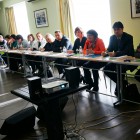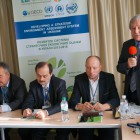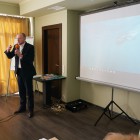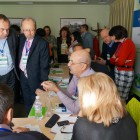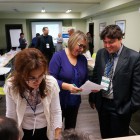 On October 25-26, Kyiv hosted a training workshop on practical application of strategic environmental assessment (SEA), organized by the Ministry of Ecology and Natural Resources of Ukraine in cooperation with the United Nations Economic Commission for Europe (UNECE), Law-Making and Information Technologies Institute NGO (Ukraine) and PLEDDG Project within the framework of the EU-funded Programme “Greening Economies in the Eastern Neighborhood” (EaP-GREEN). EaP GREEN is aimed at promoting green economy in Eastern Neighborhood countries.
On October 25-26, Kyiv hosted a training workshop on practical application of strategic environmental assessment (SEA), organized by the Ministry of Ecology and Natural Resources of Ukraine in cooperation with the United Nations Economic Commission for Europe (UNECE), Law-Making and Information Technologies Institute NGO (Ukraine) and PLEDDG Project within the framework of the EU-funded Programme “Greening Economies in the Eastern Neighborhood” (EaP-GREEN). EaP GREEN is aimed at promoting green economy in Eastern Neighborhood countries.
The aim of the two-day training workshop was to deepen participants’ knowledge of the SEA⃰ procedure in accordance with SEA regulations and enhance capacities of regional environmental and health authorities as well as local planning authorities from four target oblasts of Ukraine, involved in the PLEDDG’s SEA component, in the SEA procedure.
PLEDDG Project was represented by PLEDDG Director Oleksandr Kucherenko, PLEDDG Senior Expert in Local Governance and Economic Development Ihor Lepyoshkin and PLEDDG environmental expert Hennadiy Marushevskyi. O.Kucherenko and I.Lepyoshkin talked about PLEDDG activities, with a focus on those regarding integration of SEA into strategic decision-making in PLEDDG partner cities. They stressed that all PLEDDG initiatives would be analyzed on the subject of their possible negative environmental impact and opportunities for sustainable urban development. H.Marushevskyi presented a methodology for the SEA procedure based on Ukrainian experience, namely initial data analysis, target analysis, environmental impact assessment, identification of alternatives, and a step-wise incorporation of the SEA result.
During the workshop, the participants learned about, among other things, the SEA procedure under Ukrainian legislation and the Protocol on SEA, selected methodological aspects of SEA, the SEA scoping procedure and approaches to the preparation of the SEA scoping reports.
⃰ Strategic environmental assessment (SEA) is a systematic and preventive process of analyzing the environmental sustainability of actions that may result from proposed policies, strategies and plans. SEA reviews policies, strategies and plans and determines the types of environmental impacts (positive or negative) that might be expected as a consequence of their implementation.


